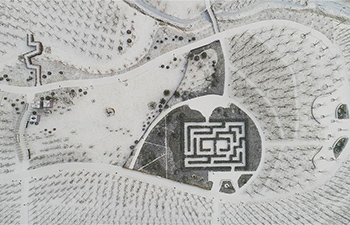WASHINGTON, Jan. 29 (Xinhua) -- An American study shows that a disorder in sleep and wake cycle might be early signs for Alzheimer's disease.
The research at Washington University School of Medicine in St. Louis has indicated that the circadian rhythm disruption occurs much earlier in people whose memories are intact but whose brain scans show early, preclinical evidence of Alzheimer's.
The findings, published Monday in the journal of JAMA Neurology, could help doctors identify people at risk of Alzheimer's earlier than currently is possible, since Alzheimer's damage can take root in the brain 15 to 20 years before clinical symptoms appear.
"It wasn't that the people in the study were sleep-deprived," said first author Erik S. Musiek, an assistant professor of neurology. "But their sleep tended to be fragmented. Sleeping for eight hours at night is very different from getting eight hours of sleep in one-hour increments during daytime naps."
The researchers also conducted a separate study in mice, to be published Jan. 30 in The Journal of Experimental Medicine, showing that similar circadian disruptions accelerate the development of amyloid plaques in the brain, which are linked to Alzheimer's.
Previous studies at Washington University, conducted in people and in animals, have found that levels of amyloid fluctuate in predictable ways during the day and night. Amyloid levels decrease during sleep, and several studies have shown that levels increase when sleep is disrupted or when people don't get enough deep sleep, according to research by senior author, Yo-El Ju.
"In this new study, we found that people with preclinical Alzheimer's disease had more fragmentation in their circadian activity patterns, with more periods of inactivity or sleep during the day and more periods of activity at night," said Ju, an assistant professor of neurology.
The study shows that subjects who experienced short spurts of activity and rest during the day and night were more likely to have evidence of amyloid buildup in their brains.
Both researchers said it's too early to answer the chicken-and-egg question of whether disrupted circadian rhythms put people at risk for Alzheimer's disease or whether Alzheimer's-related changes in the brain disrupt circadian rhythms.
"At the very least, these disruptions in circadian rhythms may serve as a biomarker for preclinical disease," said Ju. "We want to bring back these subjects in the future to learn more about whether their sleep and circadian rhythm problems lead to increased Alzheimer's risk or whether the Alzheimer's disease brain changes cause sleep and wake cycle and circadian problems."
















